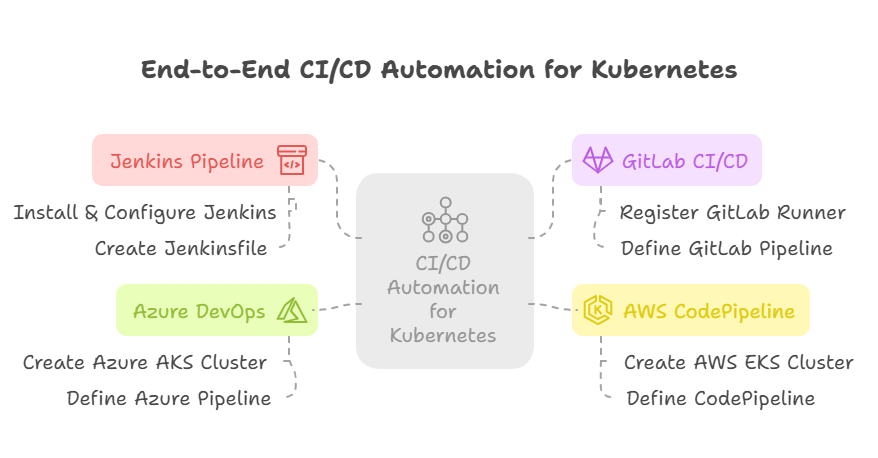📌 Part 5 Kubernetes CI/CD Automation: Best Practices with Jenkins, GitLab, AWS, and Azure
 Vikas Surve
Vikas Surve
1️⃣ Overview
CI/CD (Continuous Integration & Continuous Deployment) automates the build, test, and deployment process, ensuring rapid and reliable delivery of Kubernetes applications.
🔹 Why CI/CD for Kubernetes?
✅ Automates application deployment → Reduces manual effort
✅ Ensures consistency → Deploy the same way across different environments
✅ Supports multi-cloud → AWS, Azure, and on-premise clusters
📌 Table of Contents
1️⃣ Jenkins Pipeline for Kubernetes CI/CD
2️⃣ GitLab CI/CD for Kubernetes
3️⃣ AWS CodePipeline for Kubernetes Deployments
4️⃣ Azure DevOps Pipeline for Kubernetes Deployments
5️⃣ Best Practices & Troubleshooting
1️⃣ Jenkins Pipeline for Kubernetes CI/CD
🔹 Step 1: Install & Configure Jenkins
1.1 Launch an EC2 Instance for Jenkins
Instance Type:
t2.medium(4GB RAM)Security Group: Allow ports 8080 (Jenkins), 22 (SSH)
1.2 Install Jenkins on EC2
sudo apt update -y
sudo apt install openjdk-11-jdk -y
wget -q -O - https://pkg.jenkins.io/debian/jenkins.io.key | sudo apt-key add -
sudo sh -c 'echo deb http://pkg.jenkins.io/debian-stable binary/ > /etc/apt/sources.list.d/jenkins.list'
sudo apt update -y
sudo apt install jenkins -y
sudo systemctl enable jenkins
sudo systemctl start jenkins
✅ Verify Jenkins is running:
sudo systemctl status jenkins
🔹 Step 2: Configure Jenkins Pipeline for Kubernetes Deployment
📌 Create a Jenkinsfile in your GitLab/GitHub repository:
pipeline {
agent any
environment {
KUBECONFIG = credentials('k8s-config') // Load Kubernetes config
}
stages {
stage('Checkout Code') {
steps {
git branch: 'main', url: 'https://gitlab.com/your-repo/easyshop.git'
}
}
stage('Build & Push Docker Image') {
steps {
sh 'docker build -t easyshop:latest .'
sh 'docker push <your-dockerhub-username>/easyshop:latest'
}
}
stage('Deploy to Kubernetes') {
steps {
sh 'kubectl apply -f kubernetes/deployment.yaml'
sh 'kubectl apply -f kubernetes/service.yaml'
}
}
}
}
✅ Run the Jenkins Pipeline to automate Kubernetes deployments!
2️⃣ GitLab CI/CD for Kubernetes
🔹 Step 1: Register a GitLab Runner on an EC2 Instance
sudo apt install -y gitlab-runner
gitlab-runner register --url https://gitlab.com/ --registration-token <your-token>
📌 Select:
Executor: docker
Image: ubuntu:latest
✅ Verify Runner Status:
gitlab-runner verify
🔹 Step 2: Define GitLab CI/CD Pipeline
📌 Create .gitlab-ci.yml in your repository:
stages:
- build
- deploy
build:
stage: build
script:
- docker build -t <your-dockerhub-username>/easyshop:latest .
- docker push <your-dockerhub-username>/easyshop:latest
deploy:
stage: deploy
script:
- kubectl apply -f kubernetes/deployment.yaml
- kubectl apply -f kubernetes/service.yaml
✅ Commit & Push to trigger GitLab CI/CD pipeline!
3️⃣ AWS CodePipeline for Kubernetes Deployments
🔹 Step 1: Create an AWS EKS Cluster
eksctl create cluster --name easyshop-cluster --region us-east-1
✅ Verify Cluster:
aws eks list-clusters
🔹 Step 2: Create an AWS CodePipeline
📌 Define CodePipeline configuration in codepipeline.yaml:
Resources:
CodePipeline:
Type: AWS::CodePipeline::Pipeline
Properties:
Name: easyshop-codepipeline
RoleArn: arn:aws:iam::123456789012:role/CodePipelineRole
Stages:
- Name: Source
Actions:
- Name: GitSource
ActionTypeId:
Category: Source
Owner: AWS
Provider: CodeCommit
Version: 1
Configuration:
RepositoryName: easyshop
BranchName: main
- Name: Deploy
Actions:
- Name: DeployToEKS
ActionTypeId:
Category: Deploy
Owner: AWS
Provider: CodeBuild
Version: 1
Configuration:
ProjectName: easyshop-k8s-deployment
✅ Deploy CodePipeline:
aws cloudformation create-stack --stack-name easyshop-ci-cd --template-body file://codepipeline.yaml --capabilities CAPABILITY_NAMED_IAM
4️⃣ Azure DevOps Pipeline for Kubernetes Deployments
🔹 Step 1: Create an Azure AKS Cluster
az aks create --resource-group EasyShopRG --name easyshop-aks --node-count 2 --enable-addons monitoring --generate-ssh-keys
✅ Get AKS Credentials:
az aks get-credentials --resource-group EasyShopRG --name easyshop-aks
🔹 Step 2: Create an Azure DevOps Pipeline
📌 Define .azure-pipelines.yml in your repository:
trigger:
branches:
include:
- main
stages:
- stage: Build
jobs:
- job: Build
steps:
- task: Docker@2
inputs:
command: build
repository: 'easyshop'
Dockerfile: 'Dockerfile'
tags: latest
- task: Docker@2
inputs:
command: push
repository: 'easyshop'
tags: latest
- stage: Deploy
jobs:
- job: Deploy
steps:
- task: KubernetesManifest@0
inputs:
action: deploy
namespace: 'default'
manifests: |
kubernetes/deployment.yaml
kubernetes/service.yaml
✅ Commit & Push to trigger Azure DevOps pipeline!
5️⃣ Multi-Cloud CI/CD Best Practices & Troubleshooting
🔹 Best Practices
✅ Use GitHub/GitLab webhooks to trigger Jenkins builds
✅ Store Kubernetes credentials securely in CI/CD tools
✅ Implement Rolling Deployments in Kubernetes
🔹 Common Issues & Fixes
📌 AWS CodePipeline Deployment Fails?
✔️ Ensure Kubernetes credentials are loaded:
aws eks update-kubeconfig --name easyshop-cluster
📌 Azure DevOps Pipeline Not Deploying?
✔️ Check pipeline logs in Azure DevOps:
az pipelines runs list
🎯 Conclusion
🚀 Multi-Cloud CI/CD Automation is now fully implemented!
✅ Jenkins & GitLab deploy applications automatically
✅ AWS CodePipeline deploys workloads to EKS
✅ Azure DevOps Pipelines deploy to AKS
✅ Full Kubernetes deployment automation with zero manual intervention! 🎉
This completes the end-to-end Kubernetes CI/CD automation setup! 🚀
Subscribe to my newsletter
Read articles from Vikas Surve directly inside your inbox. Subscribe to the newsletter, and don't miss out.
Written by

Vikas Surve
Vikas Surve
I am an 𝗠𝗦 𝗖𝗲𝗿𝘁𝗶𝗳𝗶𝗲𝗱 𝗗𝗲𝘃𝗢𝗽𝘀 𝗘𝗻𝗴𝗶𝗻𝗲𝗲𝗿 𝗘𝘅𝗽𝗲𝗿𝘁 and 𝗔𝘇𝘂𝗿𝗲 𝗔𝗱𝗺𝗶𝗻𝗶𝘀𝘁𝗿𝗮𝘁𝗼𝗿 𝗔𝘀𝘀𝗼𝗰𝗶𝗮𝘁𝗲 with over 𝟭𝟬 𝘆𝗲𝗮𝗿𝘀 𝗼𝗳 𝗲𝘅𝗽𝗲𝗿𝗶𝗲𝗻𝗰𝗲 in designing, implementing, and optimizing DevOps solutions. My expertise includes 𝗖𝗜/𝗖𝗗 𝗮𝘂𝘁𝗼𝗺𝗮𝘁𝗶𝗼𝗻 𝘂𝘀𝗶𝗻𝗴 𝗚𝗶𝘁𝗟𝗮𝗯, 𝗝𝗲𝗻𝗸𝗶𝗻𝘀, 𝗮𝗻𝗱 𝗔𝘇𝘂𝗿𝗲 𝗗𝗲𝘃𝗢𝗽𝘀, as well as 𝗖𝗼𝗻𝘁𝗮𝗶𝗻𝗲𝗿 𝗼𝗿𝗰𝗵𝗲𝘀𝘁𝗿𝗮𝘁𝗶𝗼𝗻 𝘄𝗶𝘁𝗵 𝗗𝗼𝗰𝗸𝗲𝗿 𝗮𝗻𝗱 𝗞𝘂𝗯𝗲𝗿𝗻𝗲𝘁𝗲𝘀. 🔹 𝗘𝘅𝗽𝗲𝗿𝘁 𝗶𝗻 𝗱𝗲𝘀𝗶𝗴𝗻𝗶𝗻𝗴 𝗮𝗻𝗱 𝗺𝗮𝗻𝗮𝗴𝗶𝗻𝗴 𝗲𝗻𝗱-𝘁𝗼-𝗲𝗻𝗱 𝗖𝗜/𝗖𝗗 𝗽𝗶𝗽𝗲𝗹𝗶𝗻𝗲𝘀 🔹 𝗛𝗮𝗻𝗱𝘀-𝗼𝗻 𝗲𝘅𝗽𝗲𝗿𝗶𝗲𝗻𝗰𝗲 𝘄𝗶𝘁𝗵 𝗔𝘇𝘂𝗿𝗲, 𝗞𝘂𝗯𝗲𝗿𝗻𝗲𝘁𝗲𝘀 (𝗔𝗞𝗦), 𝗮𝗻𝗱 𝗧𝗲𝗿𝗿𝗮𝗳𝗼𝗿𝗺 𝗳𝗼𝗿 𝘀𝗰𝗮𝗹𝗮𝗯𝗹𝗲 𝗱𝗲𝗽𝗹𝗼𝘆𝗺𝗲𝗻𝘁𝘀 🔹 𝗣𝗮𝘀𝘀𝗶𝗼𝗻𝗮𝘁𝗲 𝗮𝗯𝗼𝘂𝘁 𝗮𝘂𝘁𝗼𝗺𝗮𝘁𝗶𝗼𝗻, 𝘀𝗲𝗰𝘂𝗿𝗶𝘁𝘆, 𝗮𝗻𝗱 𝗰𝗹𝗼𝘂𝗱-𝗻𝗮𝘁𝗶𝘃𝗲 𝘁𝗲𝗰𝗵𝗻𝗼𝗹𝗼𝗴𝗶𝗲𝘀 🛠 𝗦𝗸𝗶𝗹𝗹𝘀 & 𝗧𝗼𝗼𝗹𝘀 ✅ 𝗗𝗲𝘃𝗢𝗽𝘀 & 𝗖𝗜/𝗖𝗗: Azure DevOps, GitLab, Jenkins ✅ 𝗖𝗹𝗼𝘂𝗱 & 𝗜𝗻𝗳𝗿𝗮𝘀𝘁𝗿𝘂𝗰𝘁𝘂𝗿𝗲: Azure, AWS ✅ 𝗜𝗻𝗳𝗿𝗮𝘀𝘁𝗿𝘂𝗰𝘁𝘂𝗿𝗲 𝗮𝘀 𝗖𝗼𝗱𝗲 (𝗜𝗮𝗖): Terraform, Bicep ✅ 𝗖𝗼𝗻𝘁𝗮𝗶𝗻𝗲𝗿𝘀 & 𝗢𝗿𝗰𝗵𝗲𝘀𝘁𝗿𝗮𝘁𝗶𝗼𝗻: Docker, Kubernetes (AKS) ✅ 𝗖𝗼𝗻𝗳𝗶𝗴 𝗠𝗮𝗻𝗮𝗴𝗲𝗺𝗲𝗻𝘁: PowerShell, Shell Scripting ✅ 𝗠𝗼𝗻𝗶𝘁𝗼𝗿𝗶𝗻𝗴 & 𝗢𝗯𝘀𝗲𝗿𝘃𝗮𝗯𝗶𝗹𝗶𝘁𝘆: Grafana, Prometheus, Azure Monitor ✅ 𝗦𝗲𝗰𝘂𝗿𝗶𝘁𝘆 & 𝗡𝗲𝘁𝘄𝗼𝗿𝗸𝗶𝗻𝗴: Load Balancers, Firewalls, ClusterIP ✅ 𝗢𝗽𝗲𝗿𝗮𝘁𝗶𝗻𝗴 𝗦𝘆𝘀𝘁𝗲𝗺𝘀: Linux, Mac 💡 𝗞𝗲𝘆 𝗦𝘁𝗿𝗲𝗻𝗴𝘁𝗵𝘀 ✔ 𝗖𝗹𝗼𝘂𝗱 𝗔𝗿𝗰𝗵𝗶𝘁𝗲𝗰𝘁𝘂𝗿𝗲 & 𝗔𝘂𝘁𝗼𝗺𝗮𝘁𝗶𝗼𝗻 – Designing and managing scalable cloud solutions ✔ 𝗖𝗜/𝗖𝗗 & 𝗗𝗲𝘃𝗢𝗽𝘀 𝗟𝗲𝗮𝗱𝗲𝗿𝘀𝗵𝗶𝗽 – Implementing robust and automated software delivery pipelines ✔ 𝗧𝗲𝗮𝗺 𝗟𝗲𝗮𝗱𝗲𝗿𝘀𝗵𝗶𝗽 & 𝗠𝗲𝗻𝘁𝗼𝗿𝘀𝗵𝗶𝗽 – Leading a 5-member team, fostering collaboration and growth ✔ 𝗦𝗲𝗰𝘂𝗿𝗶𝘁𝘆 & 𝗖𝗼𝗺𝗽𝗹𝗶𝗮𝗻𝗰𝗲 – Ensuring cloud security, compliance, and best practices ✔ 𝗣𝗿𝗼𝗯𝗹𝗲𝗺 𝗦𝗼𝗹𝘃𝗶𝗻𝗴 & 𝗢𝗽𝘁𝗶𝗺𝗶𝘇𝗮𝘁𝗶𝗼𝗻 – Driving efficiency through automation and DevOps practices ✔ 𝗖𝗼𝗻𝘁𝗶𝗻𝘂𝗼𝘂𝘀 𝗟𝗲𝗮𝗿𝗻𝗶𝗻𝗴 & 𝗜𝗻𝗻𝗼𝘃𝗮𝘁𝗶𝗼𝗻 – Exploring emerging technologies and best practices